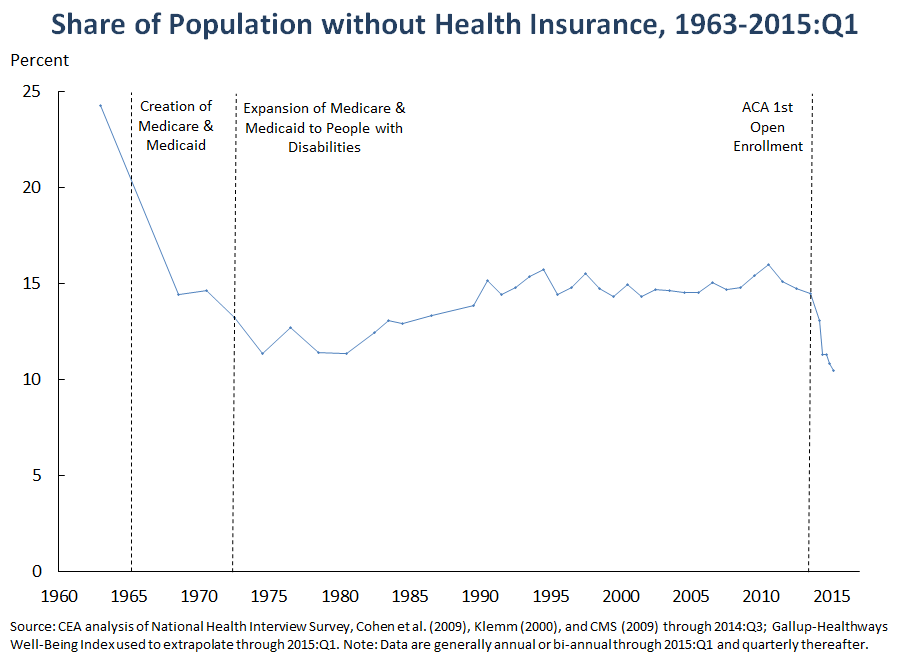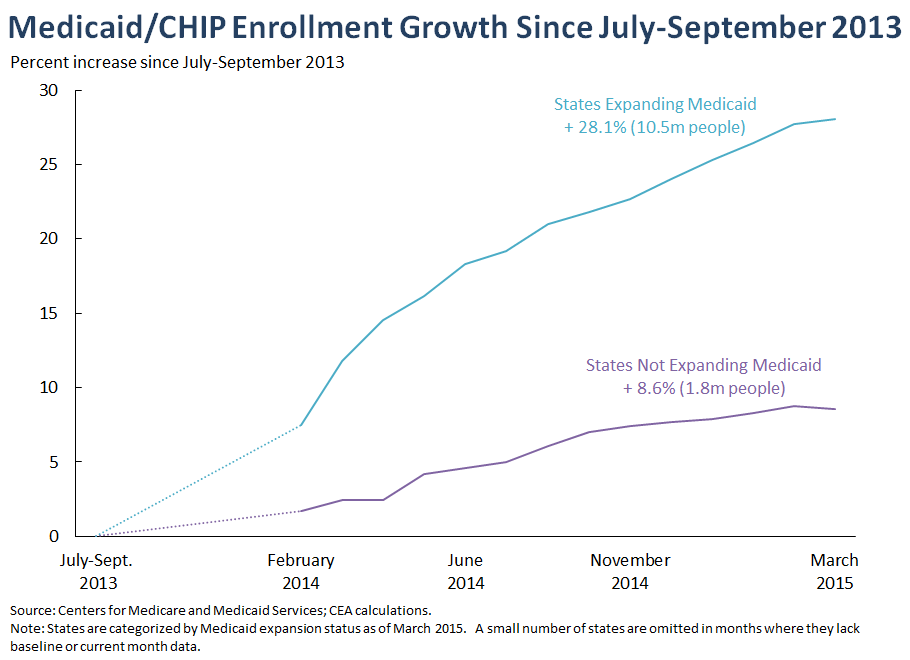
The Affordable Care Act has dramatically expanded access to health insurance coverage. Since the law’s major coverage provisions took effect at the end of 2014, the Nation has seen the sharpest reduction in the uninsured rate since the decade following the creation of Medicare and Medicaid in 1965, and the Nation’s uninsured rate is now at its lowest level ever. Combining these recent gains with earlier gains due to the law’s provision allowing young adults to remain on a parent’s plan until age 26, more than 16 million Americans had gained health insurance coverage as of early 2015.
One important way the Affordable Care Act is expanding coverage is by providing generous financial support to States that elect to expand their Medicaid programs to cover all adults with incomes below 138 percent of the Federal poverty level. New data released this morning show that the number of people with coverage through Medicaid or the Children’s Health Insurance Program (CHIP) has risen by 12.2 million people from the start of the first open enrollment period under the Affordable Care Act through March 2015. From February to March alone, the number of people with Medicaid or CHIP coverage rose by more than 500,000 people.
These increases in Medicaid enrollment have occurred overwhelmingly in the 28 States and the District of Columbia that have elected to expand their Medicaid programs. (A 29th State, Montana, has passed legislation to expand Medicaid and is working with the Centers for Medicare & Medicaid Services to determine the structure of its expansion.) Consistent with these enrollment trends, surveys have found faster reductions in the overall uninsured rate in States that have expanded Medicaid than in States that have not expanded the program, with particularly wide disparities for States’ lowest-income residents. All told, researchers at the Urban Institute estimate that, if the States that have not yet expanded the program do not change course, 4.3 million of their residents will be deprived of health insurance coverage in 2016.
Also this morning, the Council of Economic Advisers released an updated report that uses the best evidence from the economics and health policy literatures to generate State-by-State estimates of the consequences of State Medicaid expansion decisions. While estimates of the effects of future policy changes based on past experience are necessarily uncertain, this evidence leaves no doubt that the consequences of States’ decisions are far-reaching, with major implications for the health of their citizens and their economies.
The report concludes that State decisions to expand Medicaid will have major benefits for their low-income residents, including:
- Improved access to care: Expanding Medicaid improves access to needed medical services, including primary and preventive care. For example, the report estimates that if all States that have not yet expanded Medicaid did so, an additional 626,000 people would get their cholesterol checked each year once expanded coverage was fully in effect. States that have already expanded Medicaid will achieve this outcome for an estimated 609,000 people.
- Better health and longer lives: By improving access to care, expanding coverage through Medicaid improves mental and physical health and lowers the risk of death. The report estimates that if all States that have not expanded Medicaid did so, 5,200 deaths would be avoided every year once coverage was fully in effect. States that have already expanded Medicaid will avoid an estimated 5,000 deaths per year.
- Greater financial security: Expanding Medicaid reduces the risk of financial hardship due to sickness. The report estimates that if all States that have not yet expanded Medicaid did so, 611,000 fewer people will have trouble paying other bills due to the burden of medical costs. States that have already expanded Medicaid will achieve this outcome for an estimated 594,000 people each year.
The report also finds that State decisions will generate important benefits for State economies:
- Higher standard of living: State Medicaid expansions are pulling billions in additional Federal dollars into State economies. That funding boosts the standard of living of the State’s residents both by improving the lives of the newly-insured and by reducing the burden of uncompensated care for providers, taxpayers, and the privately insured. The report estimates that if the States that have not yet expanded Medicaid did so, uncompensated care costs would be $4.5 billion lower in 2016 if expanded coverage was fully in effect. States that have already expanded Medicaid will reduce uncompensated care costs by an estimated $4.4 billion in that year.
- Greater macroeconomic resilience: Better access to care and financial security for the newly insured and a reduced burden of uncompensated care will help boost demand for goods and services throughout States’ economies. This increase in demand is likely accelerating the recovery from the Great Recession in States that have already expanded the program. State Medicaid expansions will also safeguard access to health care and cushion household budgets in the face of future recessions, reducing the severity of future downturns while better protecting families from their consequences.
- Healthier, more productive workers: By improving workers’ access to care and their physical and mental health, Medicaid expansions help them live longer, healthier lives. Recent research suggests that these improvements in workers’ health could improve their productivity in the long run, boosting States’ long-run economic performance.
The full report provides a detailed discussion of the methodology used to produce these estimates and State-by-State tables breaking down these and other consequences of Medicaid expansion. It is available for download here.
Jason Furman is the Chairman of the Council of Economic Advisers. Matt Fiedler is a Senior Economist with the Council of Economic Advisers.



